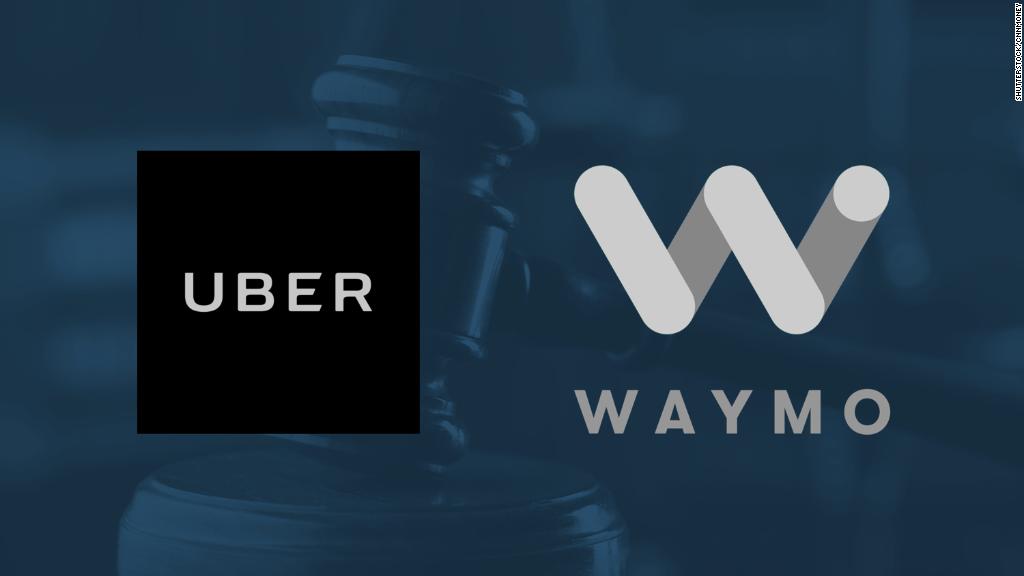
Former Uber CEO Travis Kalanick says the company he founded once had a "little brother" relationship with rival Google. But then this tech family had a falling out.
Kalanick testified Wednesday in a bombshell trade secrets trial that when Google (GOOG) led an investment in ridesharing startup Uber in 2013, his then-startup was like a younger sibling to the tech giant.
"It was like big brother and little brother," Kalanick said.
Waymo, formerly known as Google's self-driving car project, alleges a former Google engineer stole confidential files and brought them to Uber. The trial kicked off Monday and could help define the nascent yet competitive self-driving car market.
The investigation into potential trade-secret theft began in late 2016 when Waymo accidentally received an email from a supplier containing an attachment that detailed Uber's LiDAR circuit board. Waymo claimed it looked suspiciously like its own design.
Uber and Google had a strong relationship several years ago. Google invested $258 million in Uber in 2013 and integrated Uber into Google Maps the following year.
Related: The tech at the center of the Waymo vs. Uber trade secrets case
The relationship began to sour in 2015 when Uber acquired a team of robotics talent from Carnegie Mellon University, Kalanick said. (Google had been working on self-driving cars since 2009.)
Kalanick recounted a meeting with Google executives, including cofounder Larry Page. After hiring a team of self-driving engineers, Kalanick said Page was upset over the acquisition.
Kalanick recounted a phone call with Page in 2016 in which he was told, "You're taking our people. You're taking our IP."
During the conversation, Kalanick disputed that Google employees were intellectual property. Page didn't bring up the former Google engineer Anthony Levandowski or stolen Google files, Kalanick testified.
Waymo claims Levandowski downloaded thousands of files from Google servers before leaving the company in January 2016. He ultimately founded self-driving truck company Otto, which Uber bought in August 2016.
Waymo attorney Charles Verhoeven asked Kalanick about a series of text messages sent between Kalanick and Levandowski in 2016. For example, Kalanick sent a text to Levandowski in March saying, "Burn the village."
Levandowski replied: "Yup."
The former Uber CEO said he does not remember what those texts were about.
Related: Former Uber CEO Travis Kalanick takes stand in trade secrets trial
The trial between the billion-dollar tech giants briefly devolved into a debate over a Michael Douglas movie. Waymo attorneys showed a clip of fictional character Gordon Gekko's "Greed is Good" speech from the 1987 film Wall Street.
The speech advocates for greedy behavior: "Greed, in all of its forms -- greed for life, for money, for love, knowledge -- has marked the upward surge of mankind."
The former Google engineer, Levandowski, texted this clip to Kalanick in March 2016 with the message, "Here's the speech you should give ;-) ;-)." Uber tried to prevent the video from being shown in court.
Verhoeven also mentioned a Bloomberg Businessweek report published shortly after the Otto acquisition in which Kalanick told the reporter that he had only started communicating with Otto after the startup was up and running. Meetings and emails show Kalanick communicated with Levandowski about working on self-driving car projects before the engineer left Google.
During Wednesday's testimony, Kalanick said he did not read a due diligence report on Otto compiled before Uber acquired the company, nor did he read the acquisition agreement before he signed it. The due diligence report compiled by cybersecurity firm Stroz Friedberg could be key evidence for Waymo.
It states that Levandowski had five discs of Google data, but the engineer told investigators he destroyed them. Investigators could not confirm that he did. The report also found Google emails and deleted Google documents on Levandowski's personal computer.
Investigators reported Levandowski was trying to delete information while Stroz Friedberg representatives conducted an interview with him.
Kalanick testified he did not ask Levandowski to bring Google information to Uber, or that Levandowski ever told him he had Google data. Kalanick said that until the lawsuit, he hadn't heard Levandowski downloaded Google files with the purpose of bringing to Uber.
Levandowski's Otto cofounder Lior Ron also testified on Wednesday. He was previously a project manager for Google Maps and knew Levandowski at Google before the two began a self-driving truck project.
Before Uber acquired Otto, Lyft also made a verbal offer for the company, Ron revealed.
Lyft did not respond to a request for comment.

